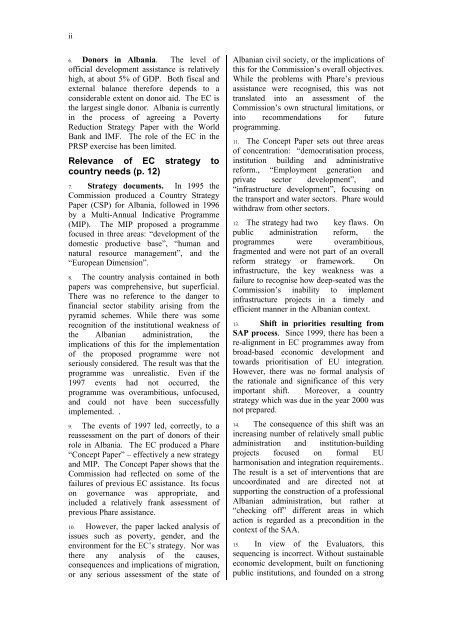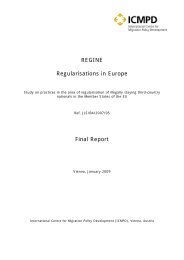Final Report - European Commission - Europa
Final Report - European Commission - Europa
Final Report - European Commission - Europa
Create successful ePaper yourself
Turn your PDF publications into a flip-book with our unique Google optimized e-Paper software.
ii<br />
6. Donors in Albania. The level of<br />
official development assistance is relatively<br />
high, at about 5% of GDP. Both fiscal and<br />
external balance therefore depends to a<br />
considerable extent on donor aid. The EC is<br />
the largest single donor. Albania is currently<br />
in the process of agreeing a Poverty<br />
Reduction Strategy Paper with the World<br />
Bank and IMF. The role of the EC in the<br />
PRSP exercise has been limited.<br />
Relevance of EC strategy to<br />
country needs (p. 12)<br />
7. Strategy documents. In 1995 the<br />
<strong>Commission</strong> produced a Country Strategy<br />
Paper (CSP) for Albania, followed in 1996<br />
by a Multi-Annual Indicative Programme<br />
(MIP). The MIP proposed a programme<br />
focused in three areas: “development of the<br />
domestic productive base”, “human and<br />
natural resource management”, and the<br />
“<strong>European</strong> Dimension”.<br />
8. The country analysis contained in both<br />
papers was comprehensive, but superficial.<br />
There was no reference to the danger to<br />
financial sector stability arising from the<br />
pyramid schemes. While there was some<br />
recognition of the institutional weakness of<br />
the Albanian administration, the<br />
implications of this for the implementation<br />
of the proposed programme were not<br />
seriously considered. The result was that the<br />
programme was unrealistic. Even if the<br />
1997 events had not occurred, the<br />
programme was overambitious, unfocused,<br />
and could not have been successfully<br />
implemented. .<br />
9. The events of 1997 led, correctly, to a<br />
reassessment on the part of donors of their<br />
role in Albania. The EC produced a Phare<br />
“Concept Paper” – effectively a new strategy<br />
and MIP. The Concept Paper shows that the<br />
<strong>Commission</strong> had reflected on some of the<br />
failures of previous EC assistance. Its focus<br />
on governance was appropriate, and<br />
included a relatively frank assessment of<br />
previous Phare assistance.<br />
10. However, the paper lacked analysis of<br />
issues such as poverty, gender, and the<br />
environment for the EC’s strategy. Nor was<br />
there any analysis of the causes,<br />
consequences and implications of migration,<br />
or any serious assessment of the state of<br />
Albanian civil society, or the implications of<br />
this for the <strong>Commission</strong>’s overall objectives.<br />
While the problems with Phare’s previous<br />
assistance were recognised, this was not<br />
translated into an assessment of the<br />
<strong>Commission</strong>’s own structural limitations, or<br />
into recommendations for future<br />
programming.<br />
11. The Concept Paper sets out three areas<br />
of concentration: “democratisation process,<br />
institution building and administrative<br />
reform., “Employment generation and<br />
private sector development”, and<br />
“infrastructure development”, focusing on<br />
the transport and water sectors. Phare would<br />
withdraw from other sectors.<br />
12. The strategy had two key flaws. On<br />
public administration reform, the<br />
programmes were overambitious,<br />
fragmented and were not part of an overall<br />
reform strategy or framework. On<br />
infrastructure, the key weakness was a<br />
failure to recognise how deep-seated was the<br />
<strong>Commission</strong>’s inability to implement<br />
infrastructure projects in a timely and<br />
efficient manner in the Albanian context.<br />
13. Shift in priorities resulting from<br />
SAP process. Since 1999, there has been a<br />
re-alignment in EC programmes away from<br />
broad-based economic development and<br />
towards prioritisation of EU integration.<br />
However, there was no formal analysis of<br />
the rationale and significance of this very<br />
important shift. Moreover, a country<br />
strategy which was due in the year 2000 was<br />
not prepared.<br />
14. The consequence of this shift was an<br />
increasing number of relatively small public<br />
administration and institution-building<br />
projects focused on formal EU<br />
harmonisation and integration requirements..<br />
The result is a set of interventions that are<br />
uncoordinated and are directed not at<br />
supporting the construction of a professional<br />
Albanian administration, but rather at<br />
“checking off” different areas in which<br />
action is regarded as a precondition in the<br />
context of the SAA.<br />
15. In view of the Evaluators, this<br />
sequencing is incorrect. Without sustainable<br />
economic development, built on functioning<br />
public institutions, and founded on a strong
















